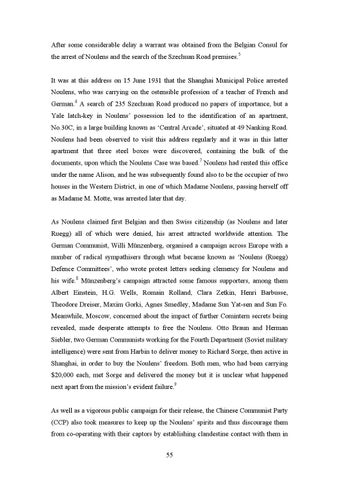After some considerable delay a warrant was obtained from the Belgian Consul for the arrest of Noulens and the search of the Szechuan Road premises.5 It was at this address on 15 June 1931 that the Shanghai Municipal Police arrested Noulens, who was carrying on the ostensible profession of a teacher of French and German.6 A search of 235 Szechuan Road produced no papers of importance, but a Yale latch-key in Noulens ’ possession led to the identification of an apartment, No.30C, in a large building known as ‘Central Arcade ’, situated at 49 Nanking Road. Noulens had been observed to visit this address regularly and it was in this latter apartment that three steel boxes were discovered, containing the bulk of the documents, upon which the Noulens Case was based.7 Noulens had rented this office under the name Alison, and he was subsequently found also to be the occupier of two houses in the Western District, in one of which Madame Noulens, passing herself off as Madame M. Motte, was arrested later that day. As Noulens claimed first Belgian and then Swiss citizenship (as Noulens and later Ruegg) all of which were denied, his arrest attracted worldwide attention. The German Communist, Willi Münzenberg, organised a campaign across Europe with a number of radical sympathisers through what became known as ‘Noulens (Ruegg) Defence Committees ’, who wrote protest letters seeking clemency for Noulens and his wife.8 Münzenberg ’s campaign attracted some famous supporters, among them Albert Einstein, H.G. Wells, Romain Rolland, Clara Zetkin, Henri Barbusse, Theodore Dreiser, Maxim Gorki, Agnes Smedley, Madame Sun Yat-sen and Sun Fo. Meanwhile, Moscow, concerned about the impact of further Comintern secrets being revealed, made desperate attempts to free the Noulens. Otto Braun and Herman Siebler, two German Communists working for the Fourth Department (Soviet military intelligence) were sent from Harbin to deliver money to Richard Sorge, then active in Shanghai, in order to buy the Noulens ’ freedom. Both men, who had been carrying $20,000 each, met Sorge and delivered the money but it is unclear what happened next apart from the mission ’s evident failure.9 As well as a vigorous public campaign for their release, the Chinese Communist Party (CCP) also took measures to keep up the Noulens ’ spirits and thus discourage them from co-operating with their captors by establishing clandestine contact with them in 55
The Records of the Permanent Under-Secretary's Department, 1873-1939

Issuu converts static files into: digital portfolios, online yearbooks, online catalogs, digital photo albums and more. Sign up and create your flipbook.